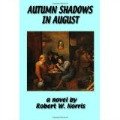Autumn Shadows touts Malcolm Lowry
but it falls short as a novel

Autumn Shadows in August by Robert W. Norris
Lulu Press
Ebook version: Smashwords.com
Publication date: February 2006
108 pages
ISBN: 1-4116-7297-6
The story in a nutshell: American expatriate and English teacher David Thompson, now in mid-life, and his Japanese wife, Kaori, fly in to Amsterdam, then travel to Switzerland and on to Florence and Rome in David’s quest to relive his earlier odyssey as a single man in his 20s. Along the way he reflects on his own life and that of Malcolm Lowry, his literary hero, particularly Lowry’s posthumously published book, Dark as the Grave Wherein my Friend Is Laid. Twice on this journey, David meets and chats with Lowry’s living ghost.

The author touts his book as “. . . modeled roughly on (Dark as the Grave) . . . and part homage to Lowry and Hermann Hess, part mushroom retrospective, and part middle-aged love story.”
Lowry’s Dark as the Grave is a tough choice as a model: that book is more personal travel journal than novel. For most writers, that genre doesn’t make for an engaging novel – not enough character development, little plot, and in this case, too much ponderous dialogue.
Autumn Shadows does follow Lowry’s model: it reads like a personal travel journal, the kind of record you’d scribble down each night to keep track of your wanderings -- “I did this. I did that. We went here. We went there. Then we went to . . .“ – each with a few lines of description. But that’s not enough for a book: these days, too many skilled journalists and travel writers have brought to life even the out-of-the way places Norris has taken notes on, let alone the tourist meccas of Amsterdam, Florence, and Rome.
In effect, the Amsterdam-Rome trip framework is merely a loose thread running through the book. The hotels, restaurants, coffee houses, museums, and famous sites all spark Thompson’s memories of his youthful journeys. The book is a stream of flashbacks through Turkey, Iran, Pakistan, Afghanistan, India, Nepal; his growing up near San Francisco; his days as a CO in a military prison; his teaching in Japan.
Norris gives us plenty of material with potential in the book – a wild drive through the mountains of Turkey en route to Iran, for instance, his revulsion at the poverty in India, a mushroom-induced mind trip. Still, these vignettes are grist for a novel -- not a novel in themselves. Autumn Shadows needs to be shaped, edited, focused into story; its characters rounded out and brought together in realistic dialogue, rather than ponderous exchanges.
I read Autumn Shadows as a judge for the Global Ebook Awards contest. It’s short – 63,000 words – but it’s slow reading. It’s replete with long-winded descriptions of places and thoughts, too many of which read as if constructed to say something meaningful. The dialog reads as written language, not spoken.
Here, for example, is a snippet from a long conversation between husband and wife:
“ . . . You know, I actually cried when looking at the paintings from his Arles period. I've never cried from just looking at a painting before. It was a new and beautiful experience."
Kaori stopped massaging my foot, flashed me a smile, and started again. "I know what you mean. I remember a lot of the feelings I had back in 1973 on my first journey to Europe and the profound influence the art and history had on me. Everything was so new and powerful and passionate, and it gave me the impetus to want to create something myself."
"That's not exactly the feeling I meant about me. It was more a private feeling. I could feel the same sadness. I felt the same sadness. And I understand how depressed and low a human being can be. You remember how I was after my operation." Kaori stopped again for a moment and looked at me with sad eyes.
"Yes, I do. That was very low."
A final note: Autumn Shadows was entered in the “multicultural literature” category of the Global Ebook Awards contest. Given the protagonist’s travels and his interracial marriage, it has much potential to be a multicultural story.
But alas, the travel gives us little insight into cultural differences or interaction. Even though the wife of protagonist Thompson (who is a white American) is Japanese, their relationship is never really explored, either in interracial terms or even as a love story.
In short, there’s plenty of material for a good novel in Autumn Shadows. Let’s hope the author develops it in a future effort.
Reviewed by Terry Marshall
For the 2012 Global Ebook Awards
Read Terry’s other book reviews
Return to home page
Enjoy this page? Please pay it forward. Here's how...
Would you prefer to share this page with others by linking to it?
- Click on the HTML link code below.
- Copy and paste it, adding a note of your own, into your blog, a Web page, forums, a blog comment,
your Facebook account, or anywhere that someone would find this page valuable.